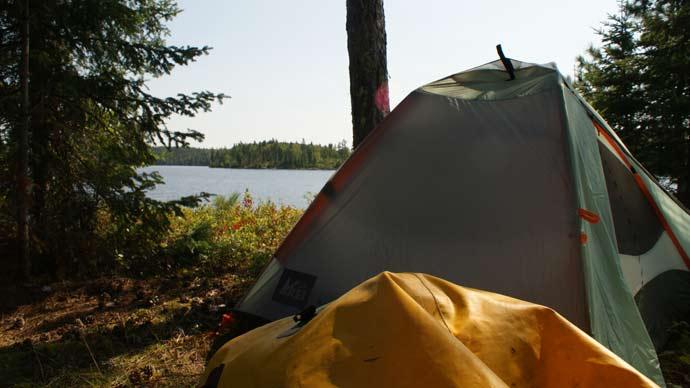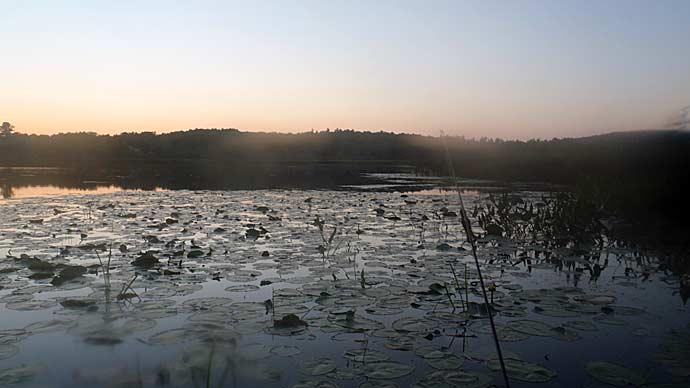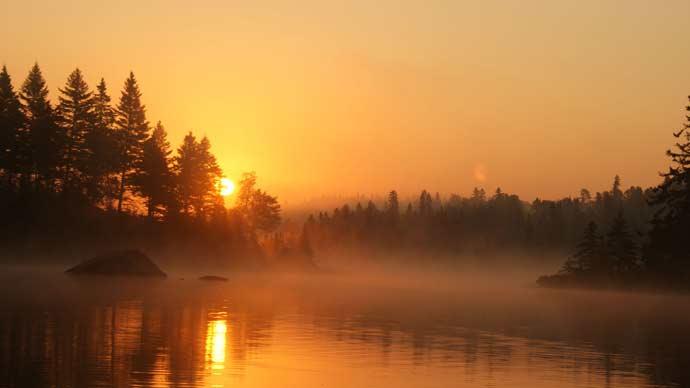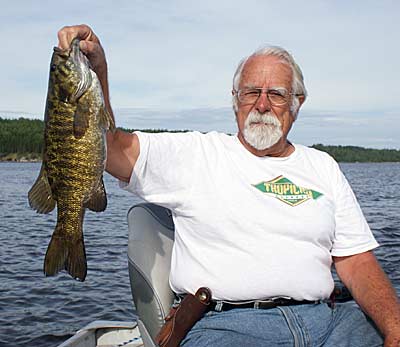
My grandfather's magazine covers showed solitary men or pairs, always in red-checkered shirts and high leather boots and often beneath blackening skies. I loved the covers better than the black and white photos inside, which seemed smudged, whereas the red checks on their shirts were always bright, especially before the storms.
I finally asked my father to take me north when I was fifteen. I'd read a story about a father and a daughter who canoed Lake Missanabie. Their canoe tipped beneath a black sky, and the daughter drowned. The father swam to shore and found their campsite shredded by a bear. I showed Dad the article.
After reading it, he asked, “Did you read all of this?”
“Uh-huh.”
“To the very end?”
I nodded.
“You know she died?”
“I won’t.”
We did, however, sink.
I blame the 12’ johnboats. They were bought at Sears, along with two Ted Williams outboards. Atop our Wagon Queen Family Truckster, a red Chevy Biscayne station wagon, our johnboats nested inside each other like plastic glasses. Our red Chevy was only a pinch more off-road worthy than a Lamborghini for logging roads. Still, it held the six of us: my three brothers, grandfather, father, and me.
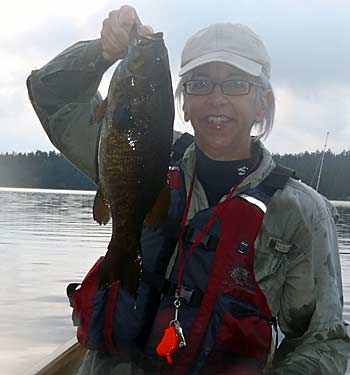
Sadly, none of the men wore red-checkered shirts—just me. Even more sadly, my grandfather wore his navy blue work pants and shirt with “Bill” embroidered above the pocket. That was sad because blackflies loved that blue. Bites deformed his face. Our aerosol can of OFF deterred as well as a white picket fence before the Blitzkrieg.
We were similarly unequipped with tents.
My oldest brother had said, “I’ll sleep under the stars.”
Mosquitoes love such bold talk.
So, I shared my slender tube tent, which became our sausage casing.
The water also teemed with bloodsuckers. I've never found another lake with so many leeches as our first. You'd wash your hands at the lakeside, and they'd flutter up to your commotion, then settle when you removed your hands, looking like wacky-hooked Senkos falling.
“Let’s swim way out there,” I suggested to a brother. They can’t flutter up from the very bottom of the lake.”
So, I swam around the boat, trying to stay warm, while he clinched the gunwales. When we wrenched ourselves back into the boat, my brother looked like Humphrey Bogart on the African Queen, freckled with leeches. I carefully plucked, and he frantically plucked, and we realized that we were right, that they couldn’t swim up one hundred plus feet, but they could move from the boat’s bottom to a boy clenching gunwales.
However, there were pike, which epitomized Ontario for me, as before that trip, I’d only seen them in those seemingly smudged black and white photos. We caught them at a river mouth, which meant a lot of weed wrangling, with and without fish. We took turns fishing, as the johnboats had so little freeboard that two to a boat was best. And we gorged like Romans.
We drove to Chapleau several times for supplies and passed many little lakes. My dad correctly guessed that no one would bother to fish such little lakes with so many larger lakes.
“Besides,” he reasoned, “we can fish three to a boat and easily swim to shore if something happens. Just make sure the person in the bow is sitting in the middle seat when underway to lift the bow.”
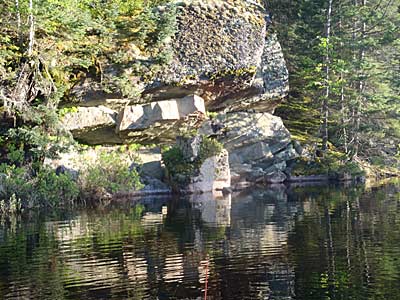
I fished with my father and grandfather while logging trucks, big-tired behemoths launching road gravel, sped past. We didn’t care, for the lake did seem unfished, as the pike were fat and striking lures as if it were their first time. Then, just like that, my grandfather hooked our Moby Dick. It was white and as creaky as our Zebcos, for it came to the net quickly and without a fuss. We had our hootenanny, and then my dad started the engine to show “the beast to the boys.”
That’s when calamity cold-cocked victory; my whooping grandfather didn’t vacate his bow seat, and our Ted Williams motor drove our boat into the water instead of over the water.
My father was right; we could swim to shore.
I saved a rod when a Daredevle’s treble hooked my sleeve. I clung to a floatation cushion with one hand and held the pike, still in the net, with the other before tales of pike attacking outboard motors and oars had me releasing it, hoping it would be merciful to me.
I’m guessing that pike rightfully bragged for years about sinking us.
A day later, the guys left except for one brother. He and I spent another four weeks on our island, moving to the Coleman tent. Within a week, we achieved what was seemingly impossible; we were weary of fishing and sick of eating those crispy, golden nuggets. So, we switched to exploration, working our way up and down the rivers that flowed to and from our lake.
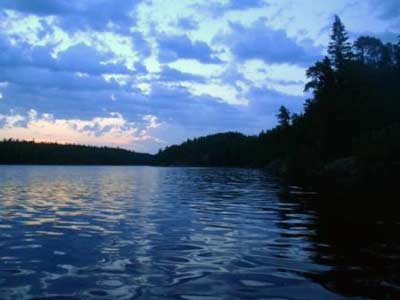
We found a trapper's cabin with long-drying socks inside and drying racks outside. Then we found another built into the side of a hill. You crawled into a windowless hovel, which was worth it just to see the rusted cans of beans still waiting to be opened and hanging socks still waiting to be donned. It seemed its builder valued his hovel enough to intend returning.
He wasn’t the only one who didn’t return. Decades later, my dad and I found a fishing camp. It was clear that no one was returning to it, as those not-easily transportable things of value were gone, the boats and motors. Even the refrigerator had been lugged and flown away; a dusty square marked where it had been. The stove remained, its base filigreed with rust. What remained was the sauna, bunkhouse, a little lodge, and empty fuel tanks, along with some saggy couches and chairs.
What confirmed its abandonment was that the guest book had been left in a heap of paper, which mainly comprised newish fishing magazines with cover titles like "37 Surefire Ways to Catch Smallmouth Bass!" In that book, those who loved the camp wrote about fish caught, laughs had, and moose, loons, and eagles seen. But that book meant nothing to the last person out the door, less than a used refrigerator. They weren’t coming back, so it was our duty to spend a couple of hours reading every guest book entry aloud and then centering it on the coffee table, removing the magazines to frame it with sacred space.
Nowadays, my father couldn’t reach that fishing camp. He’s too wobbly for the pitched Canadian Shield granite. So, I often go alone. When I was young and limber, I'd rise around sunrise. No more; I rise at four when the sleeping bag is warmest and the day is coolest. I go because the gloaming, unlike me, is still young, and the bass are ready to rise to a fly in the hushing fog.
Sadly, I no longer wear red checkered shirts. My undershirts are now water-wicking microfiber and Lycra. My quick-drying overshirts have as many pockets and doodads as Russian generals' ribbons and bars. If only such shirts were red checked too, red checks to burn brightly beneath dark skies. However, my shirts do their job. They keep me on the water when it’s raining and cool, and that's all I need as I no longer tire of fishing or fish as I did on my first turn.
This article was first published in the July 2017 issue of Gray's Sporting Journal.
Katie McKy began bassing by tying her Zebco 606 and fiberglass rod to her bike and pedaling to farm ponds with her brothers. As a teen, she fell in love with the Canadian Shield of northwestern Ontario, a land of endless lakes, where the smallmouth were also endless. She also loved the big water bassing of Lakes Superior and Michigan and the Mississippi River. She now lives on the coast of Maine and fishes overlooked bogs and ponds for largemouth and smallmouth, following the advice of another New Englander, Robert Frost, to take the road less traveled. She is a regular member of our forums, going by the screenname ol'crickety.


